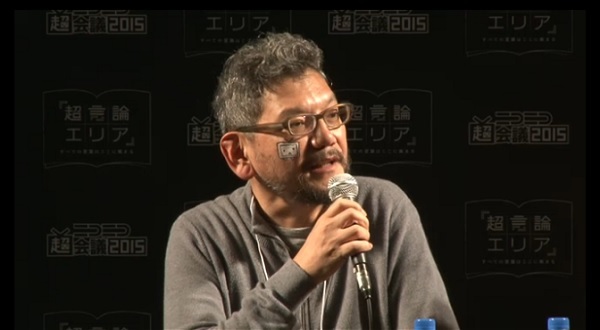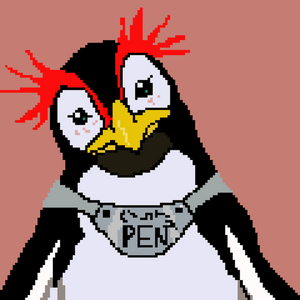Hideaki Anno: "Anime is information. I create with logic." In a conversation with Kawakami, he talks about the theory of anime production.
#NicoNico Ultra Conference 2015
NicoNico Ultra Conference 2015 (April 01, 2015 - April 26, 2015)
This is a full transcript of a conversation between Dwango's Takao Kawakami and Hideaki Anno, director of Evangelion, that took place at the Nico Nico Ultra Conference, Super Discourse Area on April 25, 2015. Anno said that "anime is made with logic," and that there is a theory behind every step of the process.
Speakers
Nobuo Kawakami, Chairman and CEO, KADOKAWA and DWANGO Inc.
Ryusuke Hikawa, Animation researcher
Hideaki Anno, President, Khara, inc.

What is the "amount of information in animation"?
Hikawa: Hello everyone. I am Ryusuke Hikawa, animation researcher. Thank you for coming today.
This is the Ultra Discourse booth of the Nico Nico Ultra Conference, and for the next hour we have Hideaki Anno, director of khara, inc. and Takao Kawakami, chairman of KADOKAWA and DWANGO, here to talk about "What is the amount of information in anime? I'd like to have a long talk with them. Thank you very much.
Anno: I'm Anno. Thank you very much for taking time out of your busy schedule today.
Kawakami: I'm Kawakami. This year's event (Nico Nico Ultra Conference) is the biggest ever. Every year the number of visitors increases, so every year it's the biggest ever, and this year it's the biggest ever too!
Hikawa: There's sumo, the Self-Defense Forces, and dinosaurs.
Anno: There's also pro-wrestling.
Hikawa: Anything is possible. Right off the bat, is this the book that inspired the theme of "the amount of information in anime"? It's a new book by Kawakami-san. It's called "The Secret of Content".
In the table of contents, it says, "What is the amount of information?". So I' d like to talk about that.
Kawakami: Yes, that's right. I was asked by a publisher to do publicity for them. I don't like doing publicity, but I thought it would be interesting to talk with Anno about the amount of information in anime, and if it's in this book, we can talk about further aspects. That's why I planned this meeting today.
Hikawa: In fact, Mr. Anno appears several times in this book, especially in the section titled "Things I thought about at Studio Ghibli", but you started as an apprentice producer, right?
Kawakami: Yes, that's right. I hadn't been working for a long time. I didn't do any work at Dwango, and I was always at Ghibli. I was talking to Mr. Suzuki all the time. I thought about a lot of things while I was there.
I watched anime as a fan, but I had never really thought about how to make anime.
Hikawa: Were you surprised when you went there and entered?
Kawakami: Yes, yes. I wrote about it in the book, but in the field of animation, the word "amount of information" is used by everyone in the field. And "amount of information" is a word that sounds like information theory, isn't it?
Hikawa: Yes, it is.
Heard various stories from Mr. Suzuki of Ghibli.
Kawakami: The reason why this word is used in the animation industry is what first got me interested in the amount of information in animation. There's a lot about it in this book.
Hikawa: So did you use this book to think about the relationship between information volume, creativity, and content?
Kawakami: Yes, that's right. The story that Mr. Suzuki told me about Mr. Takahata, Mr. Miyazaki, Mamoru Oshii, and Mr. Anno.
Hikawa: Mr. Anno also appears in the book, doesn't he?
Kawakami: Anno-san has pointed out to me that there are some mistakes in the book.
Hikawa: Is that so?
Anno: Well, a little.
Kawakami: A little (laughs).
Anno: There are a few things that are wrong here if I had a glance through the book. I don't bother to deny it, but it's wrong.
Kawakami: Hahahahahaha (laughs).
Hikawa: Putting the wrong things aside, have you ever read this book? What are your impressions of it?
Anno: It's good for people who don't know much about it. It's good as an introduction.
Hikawa: Then is it okay if I read about what you value in anime?
Anno: Yes. I think it's a good way to understand how and why things are done in anime.
It's really a good introduction.
Hikawa: A good "introduction".
Kawakami: Hahahahahaha (laughs).
Hikawa: So it's like you're trying to figure out something that you didn't understand at first?
Kawakami: Yes, it is. It's the result of thinking about what on earth creators do from a scientific perspective.
Stories are also a form of information.
Hikawa: In fact, you said that before you joined Ghibli, you were focusing on the story, as you wrote in this book.
Kawakami: That's right. I thought I was only interested in stories. But when I thought about it more, I realized that I was actually wrong.
Hikawa: What do you think about that?
Anno: But in the case of a video work, the story itself is one of the pieces of information, isn't it? I think that animation is the only way to control how much of the story is shown, given, and felt by the audience.
With live-action, you can't control everything. The good thing about animation is that you can control everything.
Hikawa: Every little detail.
Anno: That's right. When you're thinking about the story, you're controlling the information at that stage.
Whether you want a complicated story or a simple one. I think there is already a certain amount of information there.
Hikawa: Yeah, that's true. What do you think about that, Kawakami-san?
Kawakami: Anno-san is the one who started using the term "amount of information" in the first place...
Anno: There was a lot of talk about it, but when the book Anime Style came out, a friend of mine named Yuichiro Oguro was running the magazine, and he said he was going to start publishing it, so we decided to talk about it as a celebration.
When we were talking about the old Eva, he asked me how the Evangelion anime was made. I think I mentioned that "control of information" was the most important thing.
It was a book that was read by many people in the industry, and I got a lot of backlash for it at the time. "Anime is not information!".
The only person who praised me at that time was Oshii-san.
Hikawa: Oh.
Anno: He thought I was such an idiot, but I was actually smart.
Kawakami: Nowadays, people talk about the amount of information.
Anno: It's become a thing now. Back then, we used to say things like "animation is not like that", "thoughtfullness", and "passion".
Hikawa: "Soul," for example.
Anno: Of course, I think even that is information.
Anime is made with logic.
Kawakami: I think so too. When I see you making content, you're making it in a rather scientific and engineering way, aren't you?
Anno: That's right. Basically, everything is calculated and made. It's interesting that there are sometimes parts that can't be fully calculated.
Kawakami: At the end of the process, it's all about sensitivity, but up until the middle, it's all about calculation, isn't it?
Anno: It is calculation. I mostly make films based on logic.
Kawakami: It's all logic, isn't it?
Anno: It's basically logic. It's good that there are parts that are not theoretical. That's why logic is necessary, isn't it? The image itself is a scientific thing, so it's made with logic.
Montage is also a theory, isn't it?
Kawakami: Well, yes, it is.
Anno: It's so logical that it's called the montage theory. Of images.
Kawakami: When you look at it, the more experience you gain, the more you start to make things based on theory.
Anno: That's right.
Kawakami: When I listen to various people, they say that when they were young, they made films based on their sensibilities, but they just didn't understand the logic they had inside them, and gradually came to understand it. That's what it is, isn't it?
Anno: In the case of video, the first thing you do is connect the pictures. Before editing, you have to decide what kind of picture you want to put in the 16:9 frame. It's called trimming.
After the cropping, there is the editing process, and during the editing process, you have to figure out how to show more of the cropped image, and of course, there is the sensitivity of the viewer, but it is also logic.
There is also the imaginary line. There is a sense of breaking that line, but the audience is confused at that point.
But the audience is confused by that. They are also looking at it based on the same logic. I think that the audience and the person making the video need to share the same logic in order for the audience to understand. The Japanese language is also a theory.
Still have a sense of memory of TV and movies we watched as a children.
Kawakami: But logic is not something that is taught in school, is it? What percentage of the total number of people in the world have a good sense of logic?
Anno: When I was filming something in high school, I didn't really have a theory. I didn't have a storyboard or anything like that, I just thought, "If it comes to this, I want to shoot it like this. When the film came out of the developing process, I thought, "Wouldn't it be interesting if I connected it in this way?
I'm doing this based on my senses, but those senses are not something that I had in my mind originally, but I'm using my memory of how TV and movies I watched as a child were connected like this.
After a picture like this, there was a "leaning" like this. And so on. This time, I think it would be better to go to this kind of "transition".
As I continue to do this, I start to see the logic in it. It may be a logic, but it may also be a routine.
<Original JP site: https://logmi.jp/business/articles/53854>
つづく
